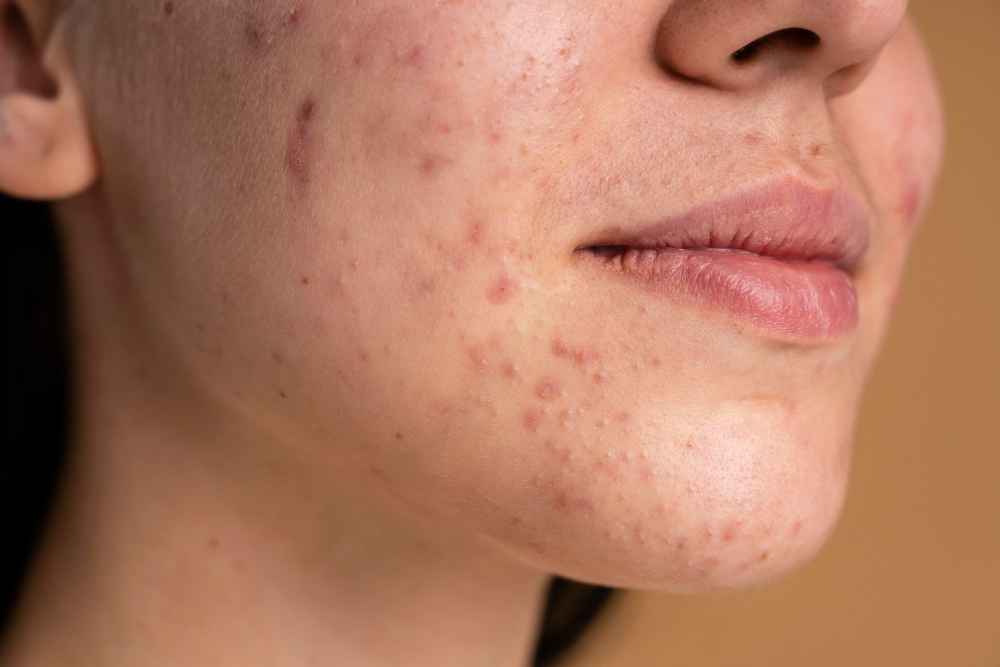Welcome to our blog post on how to get rid of acne scars! Acne is a common skin condition that affects millions of people worldwide. While it can be frustrating enough dealing with breakouts, the aftermath in the form of acne scars can leave many feeling self-conscious and eager for a solution. In this article, we will explore different types of acne scars, factors that contribute to their formation, natural remedies, skincare products, medical procedures, and preventive measures you can take to fade those stubborn marks. So let’s dive right in and discover effective ways to say goodbye to those pesky acne scars once and for all!
Types of Acne Scars
When it comes to acne scars, there are different types that can leave their mark on your skin. One common type is called atrophic scars, which appear as depressions or pits in the skin. These scars form when there is a loss of tissue during the healing process.
Another type of acne scar is hypertrophic or raised scars. Unlike atrophic scars, these are caused by an excess production of collagen during the healing process. This leads to raised and sometimes thickened areas on the skin.
Ice pick scars are another type of acne scar that gets its name from its appearance – narrow and deep holes that resemble puncture marks made by an ice pick. These scars occur when inflamed acne lesions penetrate deeply into the skin’s surface.
Boxcar scars are characterized by broad depressions with sharp edges. They often have a rectangular shape and can make your skin look uneven and textured.
We have rolling scars which give the skin a wave-like appearance due to bands of fibrous tissue pulling down on the surface layers. This creates indentations similar to small hills and valleys across your complexion.
Each type of acne scar requires specific treatment methods for effective results. Understanding what kind of scarring you have will help guide you towards choosing appropriate remedies or procedures tailored to address those specific concerns.
Factors That Contribute to Acne Scars
Acne scars can be a frustrating reminder of past breakouts. Understanding the factors that contribute to their formation is key in finding effective ways to treat and prevent them.
One major factor is the severity of the acne itself. The more severe and inflamed your acne lesions are, the higher the likelihood of scarring. Picking or popping pimples also increases the risk as it damages the skin further, leading to scar formation.
Another contributing factor is genetics. Some individuals are simply more prone to developing scars than others due to their genetic makeup. If you have a family history of acne scars, you may be at a greater risk yourself.
The healing process also plays a role in scar development. Poor wound healing or slow collagen production can result in more noticeable scars. Additionally, excessive sun exposure without proper protection can worsen existing scars by darkening them or causing hyperpigmentation.
Improper skincare routine and harsh treatments can aggravate acne lesions, making it harder for them to heal properly and increasing the chances of scarring.
By understanding these factors, you can take proactive steps towards preventing future acne scars and improving existing ones through suitable treatment options tailored to your needs.
But remember that consulting with a dermatologist is essential for personalized advice on how best to address your specific situation!
Natural Remedies for Treating Acne Scars
When it comes to treating acne scars, turning to natural remedies can be a gentle and effective approach. These remedies harness the power of nature to promote healing and fade those stubborn marks left behind by acne breakouts.
One popular natural remedy is the use of lemon juice. The citric acid in lemon juice acts as a natural exfoliant, helping to remove dead skin cells and lighten the appearance of scars. Simply apply fresh lemon juice directly onto your scars using a cotton ball or your fingertips, leave it on for about 10 minutes, then rinse off with water.
Another option is applying raw honey onto your scars. Honey has antibacterial properties that can help reduce inflammation and promote healing. Gently massage a small amount of honey onto your scars and let it sit for about 20 minutes before rinsing off with warm water.
Aloe vera gel is also known for its soothing properties, making it an excellent choice for fading acne scars. Apply a thin layer of pure aloe vera gel onto your scars twice daily, leaving it on overnight if possible.
Tea tree oil is another natural remedy that has been found beneficial in reducing the appearance of acne scarring. Dilute tea tree oil with a carrier oil such as jojoba or coconut oil before applying it directly onto your scars using a cotton swab.
Remember, consistency is key when using natural remedies. It may take some time before you see noticeable results, so be patient and stick to your chosen remedy regularly.
While these natural remedies can be effective for mild to moderate acne scarring, it’s important to consult with a dermatologist if you have severe scarring or if you’re not seeing any improvement after several months of consistent treatment.
Skincare Products to Fade Acne Scars
When it comes to treating acne scars, incorporating the right skincare products into your routine can make a significant difference. These products are specifically formulated to target and fade those stubborn marks left behind by acne.
One of the key ingredients to look for in these types of products is vitamin C. This powerful antioxidant helps brighten the skin and reduce the appearance of scars over time. Look for serums or creams that contain a high concentration of vitamin C.
Another ingredient to consider is niacinamide, also known as vitamin B3. Niacinamide has been shown to improve skin texture and reduce hyperpigmentation, making it an excellent choice for fading acne scars.
Retinol is another powerhouse ingredient when it comes to combating acne scarring. It works by increasing cell turnover and stimulating collagen production, which can help smooth out uneven skin texture caused by scars.
Don’t forget about exfoliation! Incorporating gentle exfoliating products into your routine can help slough off dead skin cells and promote cell regeneration, leading to a more even complexion over time.
Don’t underestimate the power of sunscreen in preventing further damage from UV rays. Sun exposure can darken existing acne scars and delay their healing process, so be sure to apply a broad-spectrum sunscreen with at least SPF 30 every day.
Remember, consistency is key when using skincare products for fading acne scars. Results may take time, but with patience and dedication, you’ll start seeing improvements in your skin’s appearance!
Medical Procedures for Removing Acne Scars
If natural remedies and skincare products aren’t giving you the results you desire, it may be time to consider medical procedures for removing acne scars. These procedures are typically performed by dermatologists or cosmetic surgeons and can help to significantly improve the appearance of your skin.
One common procedure is laser therapy, which uses focused laser beams to target and remove layers of damaged skin. This stimulates collagen production, helping to fill in depressed scars and smooth out uneven texture.
Another option is dermabrasion, where a rotating brush or diamond wheel is used to exfoliate the outer layer of skin. This procedure encourages new skin growth, reducing the visibility of acne scars over time.
For deeper scars, subcision may be recommended. During this procedure, a needle is inserted under the scar tissue to break up fibrous bands that are causing depressions in the skin.
In some cases, chemical peels can also be effective at improving the appearance of acne scars. A solution containing acid is applied to the skin, causing it to peel away and reveal smoother underlying layers.
It’s important to note that these medical procedures may require multiple sessions for optimal results and there can be associated risks such as redness, swelling or temporary changes in pigmentation. Therefore, it’s crucial to consult with a qualified professional who can assess your individual needs and guide you through the process safely.
While medical procedures offer effective solutions for removing acne scars, they should always be considered as a last resort after exhausting other options. It’s also essential to continue practicing good skincare habits and follow any post-procedure instructions provided by your healthcare provider.
Remember that everyone’s journey towards clear skin is unique; what works for one person might not work for another. Stay patient throughout this process while keeping an open mind about different treatment options available – together with professional guidance – we’re confident you’ll find a method that suits you best!
Preventing Future Acne Scars
When it comes to acne scars, prevention is key. By taking some simple steps, you can minimize the risk of developing new scars and promote healthier skin.
Maintaining a consistent skincare routine is crucial. Cleanse your face twice daily with a gentle cleanser to remove dirt and excess oil that can clog pores. Avoid harsh scrubbing or using abrasive products as this can further irritate the skin.
Be mindful of what you put on your face. Use non-comedogenic products that won’t clog pores and cause breakouts. Look for ingredients like salicylic acid or benzoyl peroxide which help to keep acne at bay.
Additionally, resist the urge to pick or pop pimples as this can lead to inflammation and scarring. Instead, treat any active breakouts with spot treatments containing tea tree oil or sulfur.
Moreover, protecting your skin from sun damage is essential in preventing hyperpigmentation and worsening existing scars. Always wear sunscreen with at least SPF 30 when exposed to the sun’s harmful rays.
Maintain a healthy lifestyle by eating a balanced diet rich in fruits and vegetables. Stay hydrated by drinking plenty of water throughout the day.
By following these preventive measures consistently, you’ll significantly reduce the chances of future acne scars and enjoy clearer-looking skin!
Conclusion
Acne scars can be a frustrating reminder of past breakouts, but there are several effective ways to get rid of them. Whether you prefer natural remedies, skincare products, or medical procedures, there is a solution out there for you.
Remember that everyone’s skin is different, so it may take some trial and error to find the right method for your specific needs. It’s always best to consult with a dermatologist before starting any new treatment.
By understanding the types of acne scars and the factors that contribute to their formation, you can take proactive steps towards preventing future scarring. Consistency is key when treating acne scars – whether through using topical creams or undergoing professional treatments.
So don’t let acne scars hold you back from feeling confident in your own skin. With patience and dedication, you can fade those pesky marks and achieve smoother, more radiant skin.
Remember: Clearing up acne scars takes time and effort – but trust me; it’s worth it! So start incorporating these tips into your skincare routine today and say goodbye to those unwanted reminders of past breakouts!





